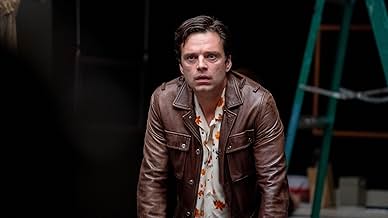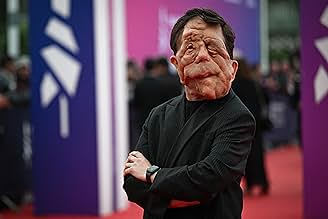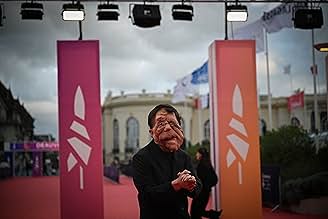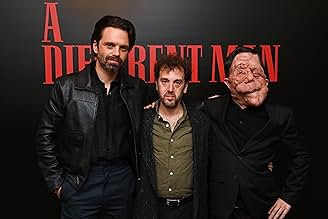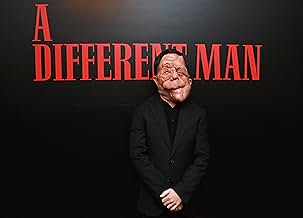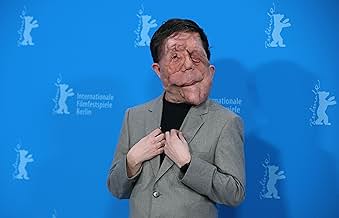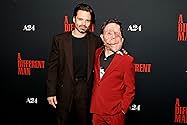Il raconte l'histoire d'Edward. Après avoir subi une opération de reconstruction faciale, il devient obsédé par un acteur dans une production théâtrale basée sur son ancienne vie.Il raconte l'histoire d'Edward. Après avoir subi une opération de reconstruction faciale, il devient obsédé par un acteur dans une production théâtrale basée sur son ancienne vie.Il raconte l'histoire d'Edward. Après avoir subi une opération de reconstruction faciale, il devient obsédé par un acteur dans une production théâtrale basée sur son ancienne vie.
- Réalisation
- Scénario
- Casting principal
- Nommé pour 1 Oscar
- 10 victoires et 60 nominations au total
Corey R. Taylor
- Luther
- (as Corey Taylor)
Avis à la une
From what I'm reading online, everyone except me seems to find this film a comedy, but for me, this felt like horror. This gave me a similar feeling to what I felt after watching Synecdoche New York even though they're very different. Both had the making of a play as a central plot point and both made me feel like I'm watching a psychological horror film.
The protagonist Edward may be very different from me but his insecurities about life, the way he hides from the past and acts through the present, only to be shown to him he can't really make it because of who he is, just hits close to home.
The way this movie nonchalantly shows how people are perceived due to how each person believes what they are is striking. Be it the person who you expect not to be popular being popular or the person you expect to be kind being not that, maybe even unbeknownst to themselves. It breaks the bubble of how such movies usually show these kinds of situations by making it very unsettling which can be perceived as darkly comical as well I guess.
Sebastian Stan is brilliant with his body language conveying all the insecurities. Adam Pearson being the charming positive force of the movie was such a surprise but it's great to see especially when it's Sebastian Stan on the other side.
One of the best movies of the year and something I won't revisit anytime soon.
The protagonist Edward may be very different from me but his insecurities about life, the way he hides from the past and acts through the present, only to be shown to him he can't really make it because of who he is, just hits close to home.
The way this movie nonchalantly shows how people are perceived due to how each person believes what they are is striking. Be it the person who you expect not to be popular being popular or the person you expect to be kind being not that, maybe even unbeknownst to themselves. It breaks the bubble of how such movies usually show these kinds of situations by making it very unsettling which can be perceived as darkly comical as well I guess.
Sebastian Stan is brilliant with his body language conveying all the insecurities. Adam Pearson being the charming positive force of the movie was such a surprise but it's great to see especially when it's Sebastian Stan on the other side.
One of the best movies of the year and something I won't revisit anytime soon.
"Edward" (Sebastian Stan) is a facially disfigured man, stuck in a rundown apartment, whose life isn't really going anywhere fast. Then he gets a new neighbour. "Ingrid" (Renato Reinsve) is a writer who befriends him and promises him a part in her play. Meantime, his doctors manage to get him on a radical course of treatment that gradually returns his face to a more normal visage. Returning to his flat, and with some fairly grotesque things emerging from his leaky ceiling, he realises that nobody recognises him anymore so he has to assume a different identity. That's when he discovers that "Ingrid" is, indeed, putting on a play - and that the old "Edward" is the title and the topic. He wants the part. It's his part. How to get it though without giving the game away? Add to his frustrations the arrival of "Oswald" (Adam Pearson) who is an ostensibly decent character but who also wants the role, and he has the aesthetics as opposed to the prosthetics. "Ingrid" has tough choices to make but where might this leave "Edward"? There's something quite circular about the way this story pans out. A sort of be careful what you wish for type scenario that gives and removes hope from "Edward" and almost creates a villain of the piece too! Is that merited or is that justified? The drama shines a light on the more shallow attitudes amidst society, on our intolerances and assumptions but it also swipes at the fickleness of friendships, fame and success - all rather engagingly delivered by both Stan and Pearson. It's the former man who positively exudes exasperation as the denouement (only vaguely) skirts the Chaplinesque. It's on that note that it's worth saying this is quite funny at times, too - the writing doesn't try to impose any morals on us, rather it presents us with some scenarios and lets us enjoy and evaluate as we go. It doesn't hang about, and right from the start we hit the ground running as the characters develop, the personalities emerge - for good or bad, and it's well worth a couple of hours in a cinema. I got more from it second time round as I was able to focus a little more on the nuance than the imagery.
"A Different Man," directed by Aaron Schimberg, sets out to explore the unsettling relationship between identity, appearance, and self-acceptance, taking the audience on a strange and, at times, uncomfortable journey through the illusions we create to feel accepted. With a style that flirts with dark humor and existential drama, the film stands out for its peculiar approach and the way it subverts expectations, refusing to deliver a redemptive or simplistic narrative. Sebastian Stan, known for his roles in blockbusters, once again steps out of his comfort zone and takes on a role that demands not only a physical transformation but also a deep dive into a character full of contradictions and vulnerabilities.
Stan plays Edward, a man with a severe facial disfigurement who dreams of becoming an actor, but whose lack of talent is as evident as his insecurity. The story gains strength by presenting Edward not as a stereotype of perseverance or inspiration, but as someone genuinely flawed-pathetic even-whose pursuit of aesthetic change is born from misguided ambition and repressed vanity. Schimberg's script succeeds in portraying Edward in a raw, unfiltered way, without resorting to easy sentimentalism. And Stan, even buried under layers of prosthetic makeup, delivers a sensitive and nuanced performance, capturing the essence of a man torn between the desire to be accepted and the inability to accept himself.
Visually, the film evokes a retro charm, with Super 16mm cinematography giving it a grainy texture and a nostalgic color palette reminiscent of urban dramas from past decades. The dense atmosphere of New York, with its worn-out streets and claustrophobic apartments, adds to the protagonist's sense of isolation and displacement. The visual style complements the subtly absurd tone of the narrative, which at times feels reminiscent of early Woody Allen films, with snappy dialogue and tragicomic situations that shift between the melancholic and the ridiculous.
The dynamic between Edward and Ingrid, played by the charismatic Renate Reinsve, adds an interesting layer to the story. Ingrid is a Norwegian playwright who moves into Edward's building with grand ambitions but carries her own insecurities as well. Reinsve delivers a magnetic performance, balancing her character's charm with a latent selfishness that keeps the audience constantly guessing about her true intentions. Their relationship unfolds in unexpected ways, oscillating between companionship and opportunism, revealing how both feed off each other's vulnerabilities.
The story takes a major turn when Edward, after undergoing a radical surgery that makes him "conventionally attractive," decides to reinvent himself as Guy, a real estate agent. This is where the film delves even deeper into the idea that appearance is just a superficial layer of identity. Even free of his old face, Edward still carries the same timid gestures, the same almost childlike insecurity, and Stan, with precise body language, brilliantly conveys this continuity. One of the film's standout scenes is an awkward encounter in a bar bathroom, where despite his new look, he still feels out of place and inadequate.
The introduction of Oswald (Adam Pearson) expands the discussion on identity and self-perception. Pearson delivers a captivating and charismatic performance, providing a stark contrast to Edward's character. Oswald, who has the same facial condition Edward once had, is confident, magnetic, and genuinely comfortable in his own skin-something Edward never managed to be. Oswald's presence acts almost like an inverted mirror, an unsettling reminder that the transformation Edward sought might never have been purely external. The chemistry between Stan and Pearson is one of the film's highlights, with dialogues filled with tension and a competitive energy, as Edward sees in Oswald everything he wished to be but never could.
The soundtrack adds an extra layer of irony and melancholy to the film, punctuating Edward's journey with tones that swing between dramatic and tongue-in-cheek. The music never underestimates the audience, suggesting complex emotions without forcing them, reinforcing the film's ambiguous tone, which never fully commits to drama or humor.
Overall, "A Different Man" doesn't offer easy answers or comfortable resolutions. The takeaway is that external transformation might change how others see us, but it doesn't necessarily alter how we see ourselves. Schimberg navigates this reflection with intelligence and a touch of provocation, questioning what truly defines our identity and how desperately we seek external validation. It's a film that unsettles, entertains, and, above all, makes you think-without ever falling into clichés or simplistic solutions.
Stan plays Edward, a man with a severe facial disfigurement who dreams of becoming an actor, but whose lack of talent is as evident as his insecurity. The story gains strength by presenting Edward not as a stereotype of perseverance or inspiration, but as someone genuinely flawed-pathetic even-whose pursuit of aesthetic change is born from misguided ambition and repressed vanity. Schimberg's script succeeds in portraying Edward in a raw, unfiltered way, without resorting to easy sentimentalism. And Stan, even buried under layers of prosthetic makeup, delivers a sensitive and nuanced performance, capturing the essence of a man torn between the desire to be accepted and the inability to accept himself.
Visually, the film evokes a retro charm, with Super 16mm cinematography giving it a grainy texture and a nostalgic color palette reminiscent of urban dramas from past decades. The dense atmosphere of New York, with its worn-out streets and claustrophobic apartments, adds to the protagonist's sense of isolation and displacement. The visual style complements the subtly absurd tone of the narrative, which at times feels reminiscent of early Woody Allen films, with snappy dialogue and tragicomic situations that shift between the melancholic and the ridiculous.
The dynamic between Edward and Ingrid, played by the charismatic Renate Reinsve, adds an interesting layer to the story. Ingrid is a Norwegian playwright who moves into Edward's building with grand ambitions but carries her own insecurities as well. Reinsve delivers a magnetic performance, balancing her character's charm with a latent selfishness that keeps the audience constantly guessing about her true intentions. Their relationship unfolds in unexpected ways, oscillating between companionship and opportunism, revealing how both feed off each other's vulnerabilities.
The story takes a major turn when Edward, after undergoing a radical surgery that makes him "conventionally attractive," decides to reinvent himself as Guy, a real estate agent. This is where the film delves even deeper into the idea that appearance is just a superficial layer of identity. Even free of his old face, Edward still carries the same timid gestures, the same almost childlike insecurity, and Stan, with precise body language, brilliantly conveys this continuity. One of the film's standout scenes is an awkward encounter in a bar bathroom, where despite his new look, he still feels out of place and inadequate.
The introduction of Oswald (Adam Pearson) expands the discussion on identity and self-perception. Pearson delivers a captivating and charismatic performance, providing a stark contrast to Edward's character. Oswald, who has the same facial condition Edward once had, is confident, magnetic, and genuinely comfortable in his own skin-something Edward never managed to be. Oswald's presence acts almost like an inverted mirror, an unsettling reminder that the transformation Edward sought might never have been purely external. The chemistry between Stan and Pearson is one of the film's highlights, with dialogues filled with tension and a competitive energy, as Edward sees in Oswald everything he wished to be but never could.
The soundtrack adds an extra layer of irony and melancholy to the film, punctuating Edward's journey with tones that swing between dramatic and tongue-in-cheek. The music never underestimates the audience, suggesting complex emotions without forcing them, reinforcing the film's ambiguous tone, which never fully commits to drama or humor.
Overall, "A Different Man" doesn't offer easy answers or comfortable resolutions. The takeaway is that external transformation might change how others see us, but it doesn't necessarily alter how we see ourselves. Schimberg navigates this reflection with intelligence and a touch of provocation, questioning what truly defines our identity and how desperately we seek external validation. It's a film that unsettles, entertains, and, above all, makes you think-without ever falling into clichés or simplistic solutions.
What I assume will be a breakout film for Aaron Schimberg, "A Different Man" explores a particular set of emotions that are attached to self-confidence while portraying the short-sided effects of instant gratification. The story provides reason to escape our imperfections until we notice someone living confidently with them. Sebastian Stan is remarkable and transformative in the role of Edward; both physically in the way that he adapts himself to the environment of constant stares and apathetic connection, and also internally with the gradual evolution of his mental complexities. Visually, the film has a 70s noir texture which is complementary to the indie aesthetic of New York City, and with flavors of drama and psychological horror, every sequence is a step in the dark and even more so with the thunderous, and at times, frightening sound design. This is such a unique project that will continue unraveling its mysteries as more people get the chance to see it.
I enjoyed A Different Man, but it fell a little bit short of my expectations because there was so much hype surrounding it. It was good, a very A24 type movie, but not the kind of movie I'll be revisiting very often.
Sebastian Stan is great, but I never admire an actor who has the task of playing a bad actor. He manages to pull it off well, while also doing some solid acting aside from that. Renate Reinsve also had the unfortunate task of playing an unlikeable character, which just seems to be her resume, but again she did well. It's hard to actually rate Adam Pearson as he is such a unique actor and the role was a little bit overbearing, but I certainly enjoyed his performance.
The story felt a little like Adaptation. (2002) at times and even a bit like The Shout (1978). I'm not quite sure how I feel about it on the whole yet, as the ending was somewhat interoperative. It's a movie that will take some digestion so my rating may change later.
Sebastian Stan is great, but I never admire an actor who has the task of playing a bad actor. He manages to pull it off well, while also doing some solid acting aside from that. Renate Reinsve also had the unfortunate task of playing an unlikeable character, which just seems to be her resume, but again she did well. It's hard to actually rate Adam Pearson as he is such a unique actor and the role was a little bit overbearing, but I certainly enjoyed his performance.
The story felt a little like Adaptation. (2002) at times and even a bit like The Shout (1978). I'm not quite sure how I feel about it on the whole yet, as the ending was somewhat interoperative. It's a movie that will take some digestion so my rating may change later.
Le saviez-vous
- AnecdotesThe picture of Edward and his mother on Edward's apartment wall is an actual picture of Sebastian Stan and his mother.
- ConnexionsFeatures Cyrano de Bergerac (1950)
- Bandes originalesOld Time Cat-O'-Nine
Written by The Lord Invador (as Rupert Grant)
Performed by The Lord Invador (as Lord Invader)
Courtesy of Shanachie Entertainment
License by Arrangement with Fine Gold Music
Meilleurs choix
Connectez-vous pour évaluer et suivre la liste de favoris afin de recevoir des recommandations personnalisées
- How long is A Different Man?Alimenté par Alexa
Détails
- Date de sortie
- Pays d’origine
- Langue
- Aussi connu sous le nom de
- Un hombre diferente
- Lieux de tournage
- Sociétés de production
- Voir plus de crédits d'entreprise sur IMDbPro
Box-office
- Montant brut aux États-Unis et au Canada
- 654 254 $US
- Week-end de sortie aux États-Unis et au Canada
- 49 466 $US
- 22 sept. 2024
- Montant brut mondial
- 1 510 108 $US
- Durée1 heure 52 minutes
- Couleur
- Rapport de forme
- 1.85 : 1
Contribuer à cette page
Suggérer une modification ou ajouter du contenu manquant

Lacune principale
What is the Canadian French language plot outline for A Different Man (2024)?
Répondre




